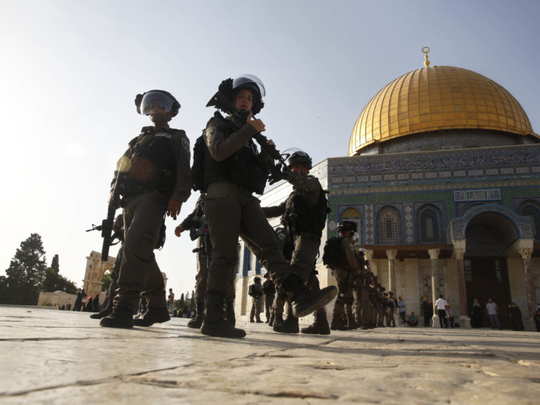
Developments in Al Aqsa Mosque and the Qatar crisis were the two topics that dominated headlines in the region’s papers.
The crisis over Al Aqsa Mosque is easing, in no small part, no doubt, due to the personal intervention of Jordan’s King Abdullah, said the Jordan Times.
“To start with, the Friday prayers at Al Aqsa saw a series of Israeli concessions to calm the situation, including opening all gates leading to the mosque and lifting the age restriction on Palestinians wishing to pray at the holy site. Israel used to allow only people older than 50 to pray there, a strange restriction, to say the least. Israel also removed the metal detectors the entrances into the mosque and even stopped body searches of worshippers. A certain degree of calm and normalcy can now be expected to return at Al Haram Al Sharif.”
The second intifada was a period of intense Palestinian-Israeli violence that looks ready to repeat itself, noted the Saudi Gazette.
“Jerusalem’s Muslim community resumed prayers inside the Al Aqsa compound Thursday after Israel removed the controversial security measures from the entrance to the holy site. The security measures are now the same as they were before the July 14 attack at the site, a victory of sorts for the Palestinians. But there was still violence on Thursday and there could be more. It may well be the case that this latest crisis is defused. However, the underlying conditions in the Palestinian territories are beginning to generate unrest among those Palestinians living inside Israel. This trend, if it persists, has the potential to exacerbate the situation in the region. Today’s Al Aqsa crisis could provide one of the sparks that ignites a dangerous cycle of violence.”
Although it has always been clear that the way out of the Qatar’s feud with its neighbouring countries is dialogue, finally that seems on the horizon, wrote Lebanon’s Daily Star.
“In recent days, the conflicting sides have begun to take a more conciliatory tone with one another, an important development in a dispute that has at times seemed intractable. The Saudi-led bloc revealed it was not placing any further sanctions on Doha, and called on Qatar to engage in dialogue, something that Qatar has recently sounded willing to do. In tandem with this, we have Saudi Arabia open up passages to the country for Qatari pilgrims seeking to go on Haj. Nothing could be of greater proof of Riyadh’s openness toward Qatar in general. Qatar must understand that resolving the issue and taking up dialogue is the only way to fully eradicate terrorism. Doha expressed its willingness to stamp out terrorism, yet it must do this with actions and not just words.”
After its failure in promoting the quadre-boycotting as a blockade and internationalising the three-month crisis, Qatar played the card of politicising pilgrimage to remind the world of its isolation, wrote the London-based Pan-Arab paper Asharq Al Awsat.
“This outdated idea was of no benefit. The Saudi government announced that it welcomes pilgrims from all over the world including Qatar and that Qatari people can continue to perform Umrah at any time and can arrive into the kingdom through any airline, except Qatar Airways. Pursuits to politicize pilgrimage are not new. Since the eighties, Tehran has been keen to politicise this religious duty under the slogan of ‘disowning polytheists’. This time it is the same Iranian call but through Qatar, which hasn’t learnt the lesson from Tehran. The idea of politicizing hajj lacks wisdom and insightfulness. Haj season will pass safely as well as the crisis with Qatar– even if late–but Qatari attempts to politicise hajj will remain an unforgettable stigma by Saudis and the government.”




_resources1_16a31069e4e_small.jpg)






